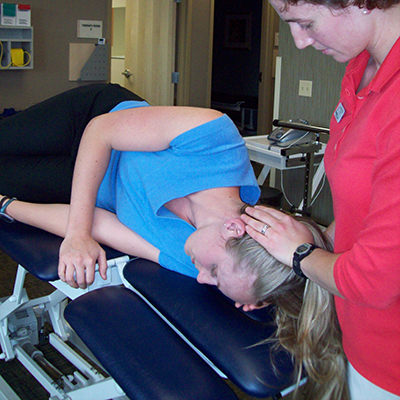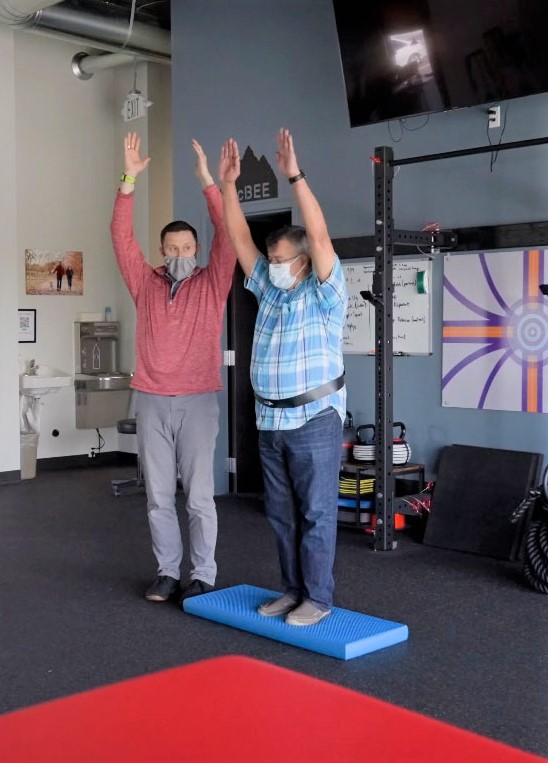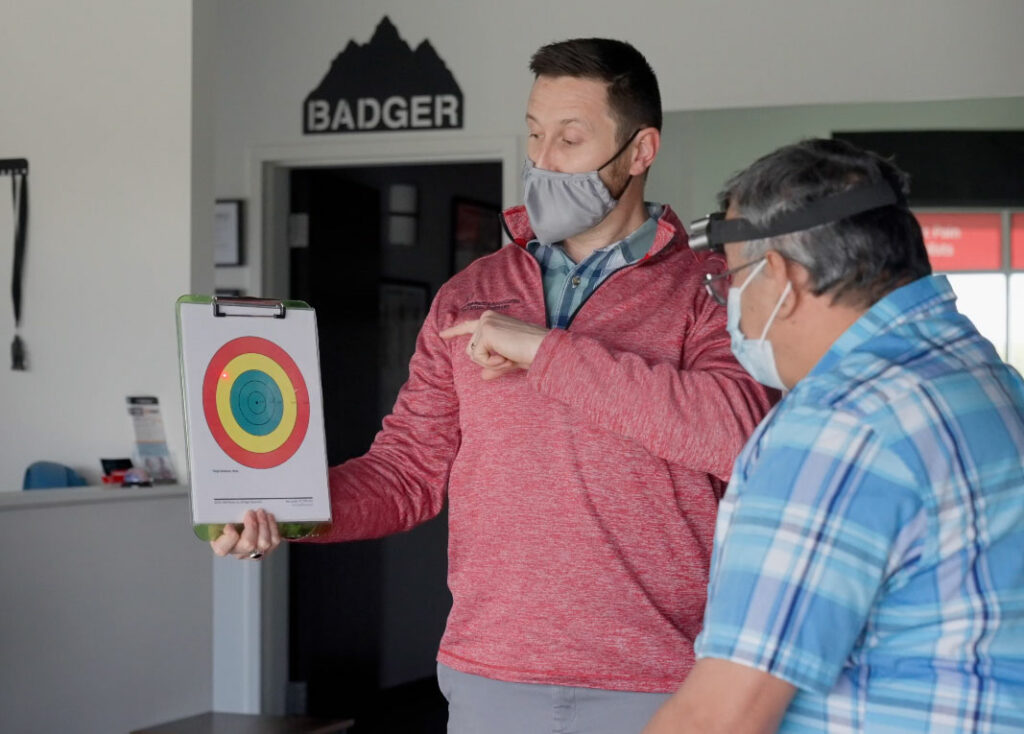People get dizzy sometimes. Dizziness can be from something simple and harmless like one too many spins on the merry-go-round with your kids. But other times people get dizzy from something more serious that requires medical attention. Let’s talk about those times, and leave the fun ways to get dizzy for another conversation.
What is dizziness?
Dizziness can go by a bunch of different names — disequilibrium, imbalance, vertigo, motion sensitivity, unsteadiness, off balance, swimming in the head, lightheadedness, or simply feeling out of sorts.
Some people just simply wake up with it one morning – the room is spinning and then, eventually, it settles down and feels normal again. But, if the feeling as if the room is spinning comes back every time you move your head in a certain way or you move your head quickly, you may have something called vertigo.
These are the most common triggers of vertigo and most commonly occur with tipping the head back or rotating it toward one side, or both of those situations. I often have patients describe symptoms of vertigo that present when they’re looking up at a high shelf when turning their head quickly while backing out of the driveway. Vertigo symptoms also tend to happen when rolling side to side while in bed. Studies show that women are more commonly affected than men (2:1) and the right side tends to be slightly more involved (1.4:1).
While vertigo tends to be the sensation of spinning or twirling while holding still, dizziness is a term typically used for other symptoms associated with disorders of the inner ear organ (labyrinthine organ).
If it has become difficult to handle motion and you get dizzy while doing simple daily tasks or activities that you used to be able to do, this can be motion sensitivity, imbalance, or disequilibrium.
How do I know if what I’m experiencing is vertigo?
I am often asked this question by friends, friends of friends, family members, and those who find me online. Honestly, it is difficult to diagnose vertigo for certain without a proper evaluation.
Since being dizzy or off-balance is not a traditional bone and joint muscle pain complaint, you might wonder, “Where can I get help? Do I go to my doctor for this? Can a physical therapist help me?”
The short answer is yes, seek care from a trained physical therapist, a medical doctor (MD), or an advanced registered nurse practitioner (ARNP) with training in this field. The specialist at the MD level is the ENT (Ear, Nose, Throat) Physician, more formally known as an Otolaryngologist.
Physical therapists who have taken specialized training and taken additional courses to learn and study these types of neurologic conditions can help you figure out what you need to do for treatment. Physical therapy might also be the only place you need to go for treatment and to find relief from dizziness or vertigo.

How does physical therapy treat vertigo?
Since this is a little off the beaten path from your typical back pain or shoulder pain, the treatment for these types of conditions looks a little different than what a physical therapist typically does. While we often work on balance issues with patients with different conditions, there is a larger emphasis on certain types of exercises and activities for people who have vertigo or similar conditions that cause dizziness.
In the physical therapy clinic, we often treat positional vertigo. Positional vertigo, which happens when someone moves their head or body into a certain position, is typically because of crystals (otoliths) that end up in the wrong area in the inner ear. This can happen in the young and old. In our younger years, it is generally caused by some kind of trauma to the head or neck such as a blow to the head or whiplash. As we age, the onset of symptoms can be more spontaneous, but the condition remains very treatable even into our elderly years.
Specially trained physical therapists can treat vertigo and eliminate the symptoms associated with the condition by utilizing a series of movements that can clear the crystals from the canals in the inner ear. Sounds crazy, but it works very well!
The most common maneuvers we use in the clinic are the Modified Epley, Half Somersault, and BBQ roll. They have strange names to be sure, but they have been effectively developed over the years and have helped many people get rid of their dizziness when it is due to certain positions of the head or body.

Does vertigo cause falls?
Balance problems, including falls, can come from issues with the inner ear and vertigo. Your equilibrium can be thrown off and this can result in a fall, sometimes with an injury. In the elderly vertigo happens more frequently and a fall can be extremely dangerous resulting in serious harm. The younger population can also experience enough dizziness to compromise their balance.

Part of treating vestibular conditions and vertigo involves working on balance and finding activities that safely challenge someone so they can develop balance skills, recovery skills, and bodily strength to handle imbalance. Addressing these issues with specific exercises for each person’s particular needs has been shown to help reduce the risk of falls and keep people mobile for longer.

Will my vertigo go away on its own?
Given enough time, perhaps your vertigo will subside without treatment. Spontaneous remissions are common, but recurrences can occur. It is uncertain how long it will take for things to resolve on their own and how long it will be before the condition comes back after it does resolve on its own. With proper treatment the problem can be treated quickly. In the case of true positional vertigo, the kind that happens specifically in one or just a few positions, diagnosis and treatment can be taken care of as quickly as 1 physical therapy visit or just a few more. You read that correctly: One (1) visit can sometimes take care of the problem completely. It is important to have an evaluation from a medical provider who is specifically trained in these conditions to have a high quality and accurate diagnosis.
Why does dizziness or vertigo last so long for some people?
When people have vertigo that lasts for extended periods of time, it is believed to be a result of habit. A person will determine which positions make them dizzy, so instead of moving through those positions, they avoid them for extended periods of time. By avoiding these positions, the crystal structures which can become loose in the canals of the inner ear are not likely to leave the wrong area and end up staying where they trigger symptoms. There are various explanations depending on someone’s particular set of difficulties, but in general this pattern of avoidance can make the problem linger on for sometimes months, years, or even decades.
Even though some bouts of dizziness can be harmless, it is important not to ignore your symptoms if they are persistent or cause you concern. If you experience recurrent, prolonged or severe symptoms of vertigo, seek medical help from a specialist – an MD/ARNP or PT – can help determine your best course of action for treatment. If your symptoms include a severe headache or chest pain, do not hesitate to head to the ER as your condition may be more serious and should not wait to be addressed.
What causes vertigo?
There are several causes of vertigo, so I will just touch on the most common ones. If you are curious about which type of vertigo you have, schedule an appointment with your physical therapist to start the evaluation process.
- Positional Vertigo (BPPV - Benign Paroxysmal Positional Vertigo): Positional Vertigo is caused by otoliths (calcium-carbonate crystals) getting displaced in the inner ear and this abnormality results in symptoms of vertigo.
- Vestibular Neuritis: This is the second most common disorder of the inner ear and is most often associated with a viral infection. It is often preceded by an infection of the chest or GI tract and patients typically experience a sudden onset of severe spinning that gets worse with movement of the head and neck.
- Meniere’s Disease and Endolymphatic Hydrops: These conditions are characterized at onset with fullness in the ear, reduction in hearing, ringing in the ear, and imbalance. They can persist anywhere from 30 minutes to 24 hours and gradually the severe symptoms reduce, and the person is generally able to move around again and walk within about 72 hours (about 3 days). These conditions are rare.
- Bilateral Vestibular Disorders: These disorders have a variety of conditions that precede them including meningitis, otosclerosis, labyrinthine infection, tumors, hydrops, neuritis, ototoxic drugs, and other times have no obvious reason why they began.
We look forward to being a part of your healthcare team.
You can call upon your specialty-trained physical therapist to be a first-line provider for vertigo. Even if you have suffered for a long time, physical therapy can be a great option to begin to get better. If you or someone you know is suffering from dizziness or any other off-balance condition, contact Therapeutic Associates Physical Therapy near you. Our experts will be a great starting point for you on your path to recovery and getting back to living your life completely again.

